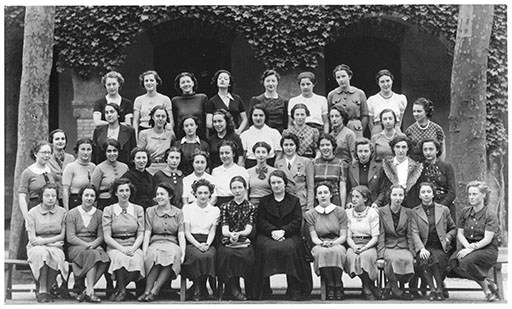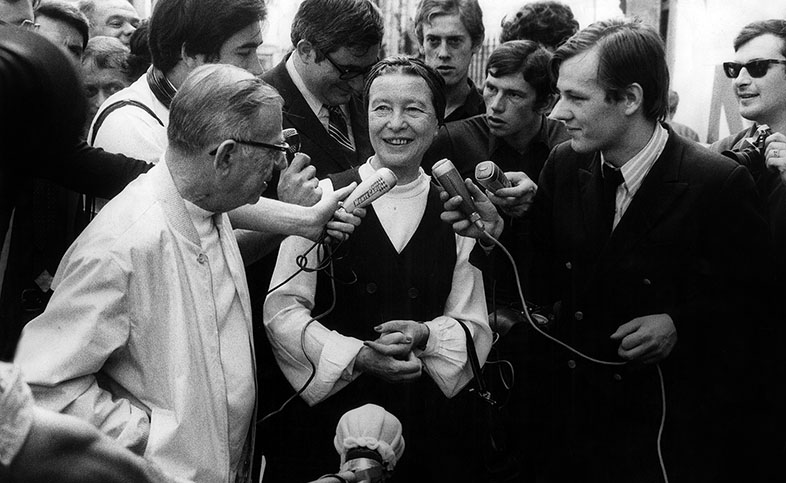2.2 The Second Sex and existentialism
You will now continue to explore Simone de Beauvoir’s The Second Sex.

Read the following extract, then answer the questions about it.
Even when her rights are recognised abstractly, long-standing habit keeps them from being concretely manifested in customs. Economically, men and women almost form two castes; all things being equal, the former have better jobs, higher wages and greater chances to succeed than their new female competitors; they occupy many more places in industry, in politics, and so on, and they hold the most important positions. In addition to their concrete power they are invested with a prestige whose tradition is reinforced by the child’s whole education: the present incorporates the past, and in the past all history was made by males. At the moment that women are beginning to share in the making of the world, this world still belongs to men: men have no doubt about this, and women barely doubt it. Refusing to be the Other, refusing complicity with man, would mean renouncing all the advantages an alliance with the superior caste confers on them. Lord-man will materially protect liege-woman and will be in charge of justifying her existence: along with the economic risk, she eludes the metaphysical risk of a freedom that must invent its goals without help. Indeed, beside every individual’s claim to assert himself as subject–an ethical claim–lies the temptation to flee freedom and to make himself into a thing: it is a pernicious path because the individual, passive, alienated and lost, is prey to a foreign will, cut off from his transcendence, robbed of all worth. But it is an easy path: the anguish and stress of authentically assumed existence are thus avoided. The man who sets the woman up as an Other will thus find in her a deep complicity. Hence woman makes no claim for herself as subject because she lacks the concrete means, because she senses the necessary link connecting her to man without positing its reciprocity, and because she often derives satisfaction from her role as Other.
The Second Sex develops several existentialist ideas. In the passage you have just read, Beauvoir expresses some ideas in a way that may not be clear to the reader who is not very familiar with existential philosophy. In particular, she writes about ‘the metaphysical risk of a freedom that must invent its goals without help’; ‘the temptation to flee freedom and to make himself into a thing’; and the ‘anguish and stress of authentically assumed existence’. Let us take these ideas in turn.
What is ‘the metaphysical risk of a freedom that must invent its goals without help’? It is not important for our purposes that you understand the adjective ‘metaphysical’, derived from metaphysics, a branch of philosophy. Here, just take it to mean that the risk affects the very nature of the individual’s existence. Beauvoir refers to the existentialist conception of human beings as free, as seen above. Why for her do goals have to be invented ‘without help’? This is because, like Sartre, she thinks that there are no values outside ourselves; therefore nobody can tell us which goals are worthy and which are not. Human beings have no predetermined destiny; human existence has no meaning outside the meaning that we create ourselves. For existentialist philosophers, human beings can create goals and meanings because they are free. We have also seen that this freedom is a ‘heavy responsibility’, and that in fact for Sartre ‘we are condemned to be free’. In other words, it is often easier to pretend that we have no choice, rather than make difficult decisions and assume the responsibility of their consequences.
Beauvoir agrees with Sartre that freedom is a heavy responsibility. In the passage that you have read, she claims that it is characteristic of the female condition to avoid the risk that the exercise of freedom involves. Precisely because freedom is such a heavy burden, any human being is tempted ‘to flee freedom and to make himself into a thing’. Like Sartre, Beauvoir thinks that if human beings regard themselves as having a pre-determined nature and purpose, they make themselves into things. As explained in the video, Jean-Paul Sartre and Existential Choice [Tip: hold Ctrl and click a link to open it in a new tab. (Hide tip)] , for Sartre, and for Beauvoir, an object like a penknife is unlike a human being, as it has been designed to be a certain way and to serve a determined purpose. However, for Beauvoir, girls are raised to accept the (false) idea that being a woman in the way that society, upbringing and history suggest, is an inescapable condition. Women are ‘prey to a foreign will’ – a will other their own – as they accept the ideas and goals that have been imposed on them. However, she writes that this is an ‘easy path’: once again it is easier to avoid the ‘heavy responsibility’ of freedom than to embrace it.
Activity 4 Simone de Beauvoir – The Second Sex (Part C)
1. At the end of the excerpt, Beauvoir lists three reasons why a woman does not exercise her freedom. What are these?
Beauvoir explains that it is an easy path to accept one’s condition as unchangeable, and to submit to other people’s wills because it avoids ‘the anguish and stress of authentically assumed existence’. To live ‘authentically’, for existentialists, is the opposite of living in bad faith: it means to live without self-deception, embracing one’s freedom and taking responsibility for one’s actions. This freedom is not easy to embrace, in fact it produces a sense of ‘anguish’. ‘Anguish’ is another key term of existentialist philosophy, which aims to describe the feeling associated with carrying the responsibility of choice without the help of objective values, authorities who can guide you, or religious beliefs.
Answer
Beauvoir claims that a woman does not exercise her freedom because she lacks the ‘concrete means’ to do so; because she senses ‘a necessary link’ connecting her to a man in an asymmetrical relation; and because she ‘often derives satisfaction from her role as Other’.
2. Some of the reasons why women do not embrace freedom appear not to depend on women’s refusal to exercise their freedom, but rather on factors over which they have little or no control. What are these, in your reading?
Answer
Economic reasons are important, as women have less money and less significant jobs; power, which probably includes political, social and cultural power. Beauvoir also writes that this power is invested with prestige: men and their opinions have a social weight and authority that women’s lack. Education is another important factor. Girls and boys are taught to respect the prestige that men carry. Beauvoir also mentions that neither men nor women doubt that the world belongs to the former.
3. Recall that Gary Gutting writes that Beauvoir, unlike Sartre, ‘recognizes that some features of [a woman’s] situation may well be obstacles to [her] freedom no matter how [she] choose[s]’. Do you think that in the excerpt you have just read there is some evidence in favour of Gutting’s interpretation?
Answer
Yes. Beauvoir shows that women find themselves in a world that has been shaped by men, who have greater economic and political power. They do not appear even to know that things could be different, due to their situation and their upbringing.
